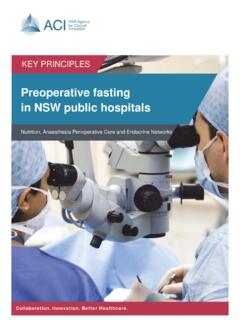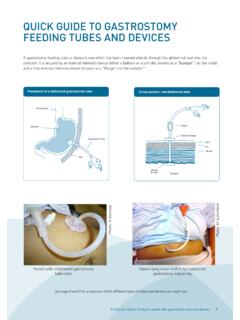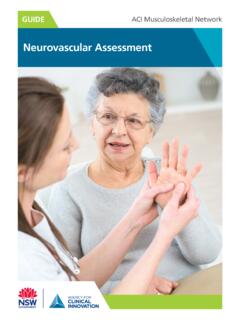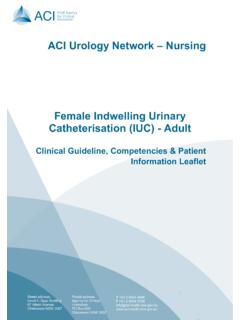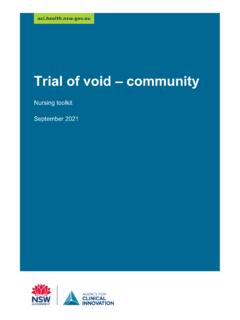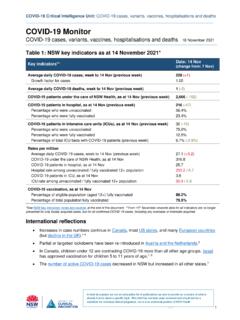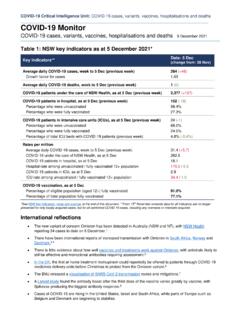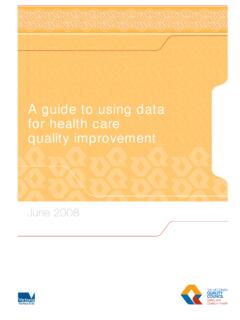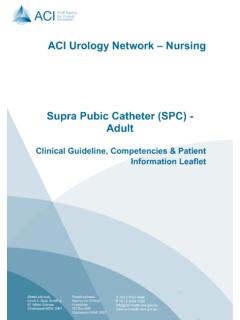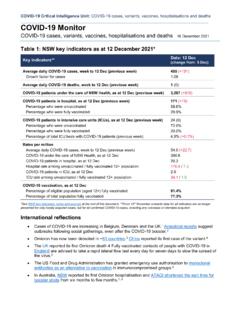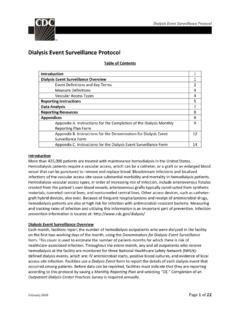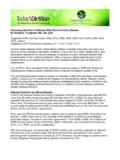Transcription of Evidence check - Immunocompromised patients and …
1 COVID-19 Critical Intelligence Unit 28 April 2021 1 Evidence check 28 April 2021 Immunocompromised patients and COVID-19 vaccines Evidence check question What is the Evidence on COVID-19 vaccination for Immunocompromised patients including risks and adverse events, efficacy and advice from professional colleges? In brief Evidence on COVID-19 vaccination in Immunocompromised patients is limited. Small studies suggest that immunosuppression may be associated with attenuated immune response to SARS-CoV-2 in some patients after the first (1-3) and second vaccine dose.(4-7) o A pre peer review publication in haemodialysis patients showed dialysis patients had significantly lower SARS-COV-2 S antibody titres than healthy control patients 21 days after vaccination with BNT162b2.
2 (5) o Three studies (including one pre peer review) in kidney transplant recipients found Immunocompromised patients have a weaker anti-SARS-CoV-2 antibody response after vaccination.(2, 3, 7) o A study of solid organ transplant recipients observed expected, typically mild, minimal peri vaccine reactogenicity after the first dose, similar to reported rates in non-organ transplant recipients.(3) o In patients with chronic inflammatory diseases, messenger ribonucleic acid (mRNA) vaccines result in development of antibodies without considerable side effects or induction of disease flares, however immunoglobulin G titres were significantly lower compared with controls.(6) o In patients with rheumatic and musculoskeletal diseases, most participants (74%) had detectable anti-SARS-CoV-2 antibodies; however, patients on regimens including mycophenolate or rituximab were less likely to develop an antibody response.
3 (8) One systematic review found inclusion of people with Immunocompromised kidney disease in completed and ongoing COVID-19 vaccine trials was very low ( ) thus, vaccine immunogenicity is largely unknown.(9) Rapid Evidence checks are based on a simplified review method and may not be entirely exhaustive, but aim to provide a balanced assessment of what is already known about a specific problem or issue. This brief has not been peer-reviewed and should not be a substitute for individual clinical judgement, nor is it an endorsed position of NSW Health. COVID-19 Critical Intelligence Unit 28 April 2021 2 Other articles included in this Evidence check are mainly based on experience with vaccinations for other infectious diseases such as influenza, and on expert consensus from international professional societies.
4 (13-17) The World Health Organization currently advises that it is safe to vaccinate Immunocompromised patients with the Pifzer-BioNTech (BNT162b2) vaccine, Moderna mRNA-1273 vaccine, and AstraZeneca AZD1222 vaccine.(15) Expert consensus from international professional societies generally recommends vaccination for Immunocompromised patients , as they are at increased risk of severe COVID-19 infection and benefits likely outweigh harms. Vaccination response may be reduced compared to non- Immunocompromised people.(17, 19-25) Inactivated, nucleic acid and protein subunit vaccines are considered safe, while special considerations are needed for live-attenuated vaccines. Non-replicating and replicating viral vector-based vaccines are considered safe by some professional groups, however a literature review concluded special considerations are needed for this type of vaccine.
5 (23) Vaccination does not replace the need for other public health measures such as physical distancing.(27-30) Recommendations for specific patient groups Cancer: professional societies internationally recommend cancer patients , including those receiving active treatment, to be prioritised for vaccination. For patients undergoing certain therapy specific recommendations on timeframes between treatment and vaccination are suggested, including three months after haematopoietic cell transplantation or cell therapy, after the recovery of absolute neutrophil count for those receiving intensive cytotoxic chemotherapy, vaccinate before immunosuppressive chemotherapy, and whenever the vaccine becomes available for patients with solid tumour malignancies receiving cytotoxic chemotherapy, targeted therapy, checkpoint inhibitors and other immunotherapy, and radiation therapy.
6 (31-37) Inflammatory bowel disease: vaccination should be prioritised as benefits are likely to outweigh harms. Inactivated vaccines, such as mRNA, are safer than live-attenuated vaccine.(35-37) Kidney disease: most candidates ( ) with Immunocompromised kidney disease were unqualified for participation in COVID-19 vaccine trials, so the vaccine immunogenicity is not well understood.(9) Guidance and recommendations regarding efficacy and timing of vaccination mainly rely on Evidence from other vaccines.(27, 38) A recent cohort study found that the anti-SARS-CoV-2 antibody titres in haemodialysis patients were significantly lower than those healthy participants after the second vaccination.
7 (5) Liver diseases: vaccination is recommended to be given to patients prior to liver transplant or three to six months after. Success of vaccination depends on the staging of chronic liver disease at the time of immunisation.(28, 38-40) Multiple sclerosis: reduced vaccine responses are expected, window period for vaccination in patients receiving B cell-depleting therapies, such as Alemtuzumab, should be optimised in consultation with treating physicians.(2, 3) A case study reported the attenuated immune response to SARS-CoV-2 in a patient with relapsing-remitting multiple sclerosis after two doses of Pfizer vaccination.(4) Neuromuscular disorders: potential for reduced efficacy of vaccination, however benefits likely to outweigh risks.
8 (42) COVID-19 Critical Intelligence Unit 28 April 2021 3 Rheumatic diseases: the German Society for Rheumatology recommends not to discontinue or delay anti-rheumatic therapies in patients with well-controlled disease, while the Australian Rheumatology Association has provided the guidelines for surgery and vaccination is best to defer after rituximab infusion as advised by the individual s rheumatologist.(13, 46) A prospective study showed that certain lymphocyte-modulating therapies were associated with diminished humoral vaccine response to SARS-CoV-2 in Immunocompromised rheumatic patients .(8) A survey of patients found the response to the first dose of COVID-19 mRNA vaccine was generally localised and mild.
9 (44) Transplant: guidance generally supports the benefits of vaccination and recommends adjustment to treatment agents for kidney transplantation.(15, 16) Two studies found that immunosuppression may be associated with a weaker anti-SARS-CoV-2 antibody response in kidney transplant recipients after the first mRNA vaccine dose.(1, 2) In another study, transplant recipients mainly experienced mild adverse events after receiving the first dose of mRNA vaccine.(3) Limitations Currently available Evidence on this topic is low quality and based on one systematic review, eight small studies and multiple commentaries. Evidence is continuing to emerge on these patients . Guidance on vaccinating Immunocompromised people should be interpreted in the context of individual disease staging and underlying comorbidities.
10 The literature search strategy for this Evidence check focused on immunosuppression, but not on individual conditions. Background To date, 13 vaccines have been registered in one or more countries, including two in Australia.(47, 48) COVID-19 vaccine studies are still emerging, however the immune response and efficacy of protection against SARS-CoV-2 among the immunosuppressive or Immunocompromised population remain unknown.(50) Immunocompromised individuals are often excluded from participating in the vaccine clinical trials due to the risk of potential immune dysregulation inherent to their disease or the immunosuppressive therapy.(9, 50) Guidance on the safety and effectiveness of COVID-19 vaccines for these people often relies on past experiences with other well-known vaccines such as influenza and polio, and a careful risk assessment weighing the benefits and harms of vaccination for the individual.
